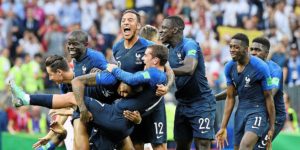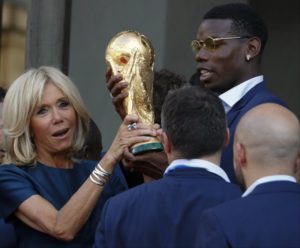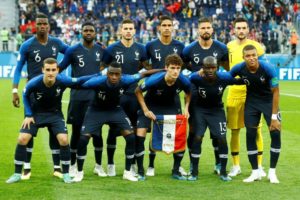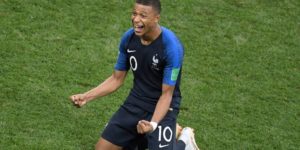FRENCH DEFENCE and DEFENSIVENESS
French footy fans are on the verge of a mental breakdown because they’ve been asked to thank Africa for the World Cup victory.
That was one of the quips made by Daily Show presenter Trevor Noah and others after France beat Croatia in the final.

Name-checking Africa hadn’t been a big deal until a few fragile fans made it one, demanding we Stop saying Africa won the World Cup! Stop it, stop it!
“Those who say, ‘Bravo Africa for your victory,’ go f**k yourselves!” tweeted French basketball player Nicolas Batum. (He later added a more polite English version.)
Easy, fam!
Evoking players’ African heritage is to be expected when the France portrayed to the world is mainly white, only to be suddenly transformed into a mostly black national team. That stands out.
No sooner did Trevor Noah joke that “Africa won the World Cup”, than the French ambassador wrote in to complain.
“By calling them an African team, it seems you are denying their Frenchness,” wrote Gérard Araud.
To which Noah rightly asked, “Why can’t they be both?”
Araud then tweeted that Noah is borrowing the far-right argument that you can’t be French if you’re black. Which is precisely the opposite of what Noah said.
Some people have trouble carrying two ideas in their head at the same time.
It is true that describing French citizens as Africans is also a tactic used by racists to marginalise people of colour. That’s based on an exclusive notion of nationality, where one must belong to one team or the other. But the rest of us know we can be many things at once.
Trevor Noah (Swiss-German and South African), former US president Barack Obama (American and Kenyan), and others (like me – Irish-Jamaican), say players can celebrate both their French identity AND their African heritage.

Brigitte Macron et Paul Pogba
Paul Pogba and his teammates say they’re proud to be French. That doesn’t mean Pogba ignores his Guinean heritage, or that Kylian Mbappé has shed his Algerian-Cameroonian culture. Their playlists feature Caribbean, French-Congolese and French-Senegalese artists, and are a tribute to pan-African and global diversity in all their glory.
The champs are part of an increasingly multicultural generation, no more bound to one culture than they are to one team, as their cross-border swaps for eye-watering sums remind us.
Only extremists and nationalists try to mould us all into one people. Only an impoverished intellectual climate forbids us from celebrating a multiplicity of cultures.
Commentators have compared this year’s team to the World Cup winners of 20 years ago, feted as “Black, Blanc, Beur” – a team of black, white and French-born of African parents.
They were thought to herald a new era, all but purged of racial division. But little was actually done, and dreams of racial tolerance didn’t last.
The far-right Front National went on to the second round of presidential elections four years later – as they did again last year. That’s worth spelling out: an anti-immigrant party teeming with racists beat out a wide array of political parties in the first round, twice in 20 years.

Why?
Because people indulged in the same facile shortcuts they use today, thinking symbols of harmony and slogans of “vivent ensemble” (live together) would magically heal festering societal wounds and resolve complex socio-economic problems entrenched in race and class.
The lessons of ‘98 were never learned. Since then, riots have erupted in France’s quaintly named “sensitive areas,” as the political class presides over neglected banlieues, growing inequality and an “economic and social apartheid” – to cite a rare insight of former Prime Minister Manuel Valls.
The discomfort of well-meaning French folks in the face of a light-hearted international conversation, suggests people are still not comfortable talking about touchy themes. A similar white fragility prevails in the US and Canada, where the easily offended routinely say, “it’s not the time to talk about race.”
It seems it never is.
The French government refuses to collect data on ethnic identities, because it continues to labour under the illusion that we live in an equal society with no social divisions worthy of closer scrutiny.
Some have swallowed whole the flimsy French myths of liberté, solidarité et fraternité, oblivious to conditions on the ground that attest to the opposite.
Annabelle Timsit wrote “the point is to celebrate a common heritage, based on values and a code of life, that unites all French people, as opposed to highlighting what makes them different from one another.”
How sweet. Tell that to the cops when they’re brutalising boys in les banlieues. Tell that to the TV channels that cover black Frenchmen on the pitch but are less keen to have them present the news or take on managerial roles. Tell that to employers who’d rather hire Pierre and Philippe than Mamadou or Mohamed.
Simply declaring people’s “Frenchness” does not make it so. It’s a way of brushing aside lived realities largely determined by class and ethnic origin.

Kylian Mbappé
The notion that citizens are French and only French is a kind of wishful thinking. It’s a stab at cultural homogenisation that fails to acknowledge highly variable realities, perspectives and identities.
To be sure, France has come a long way. We are, mostly, united in our opposition to the fascist exclusion of people of colour. But many are uncomfortable talking about identity in more ways than one. Note how quickly people reveal their unease. There’s still baggage waiting to be unpacked.
When France got into trouble in the World Cup it was repeatedly saved by a strong and dynamic defence.
Now, let’s talk about French defensiveness. And other nations stuck in a similar post-colonial denial should pay as much attention to this as they did to people kicking a ball.

